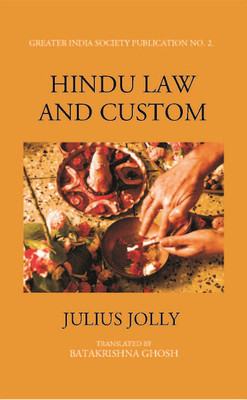HINDU LAW AND CUSTOM(Hardcover, JULIUS JOLLY)
Quick Overview
Product Price Comparison
About the Book:-The most important recent history in the field of Ancient Hindu Law is that of the Arthasastra which though a text-book of Polity is replete with useful information on Law and Judicature as well. Many of its legal rules, it is true; agree literally with the law of the Smritis. What is more, the general tendency of the Arthasastra is directed towards Artha or gain as the name of the book implies, whereas Dharmashasta lays down rules of Dharma whenever it comes into conflict with Artha. This explains the fact that the law of evidence in the Dharmasastra includes the administration of ordeals as belonging to the religious side of the law, whilst the Arthasastra omits ordeals but introduces judicial torture of various kinds instead. The antiquity of judicial torture in India is proved by its occurrence in the Dasakumaracarita and in the Mrichhakatika. Another characteristic of the feature of the law of evidence of the Arthasastra consists of the extensive employment of spies for finding out corruptible judges, perjured witnesses, forgers, wizards, prisoners, thieves, and others. The Dharmasastra on the other hand tries to establish truth by addressing long admonitions to witnesses in a case and admits perjury to be expiated by a penance in cases where the life of a person is at stake. The book is the product of the extensive study and research of this topic. The book is an indispensable one in the context of the Ancient Hindu Law. About the Author:-Professor Julius Jolly (1849 ŌĆō 1932) was a German scholar and translator of Indian law and medicine. Jolly was born in Heidelberg, the son of physicist Philipp Johann Gustav von Jolly (1809-1884), and studied comparative linguistics, Sanskrit, and Iranian languages in Berlin and Leipzig. His doctoral thesis was Die Moduslehre in den alt-iranischen Dialekten ("Moods in Ancient Iranian Dialects"). He became a Professor in the University of W├╝rzburg in 1877, in the fields of comparative linguistics and Sanskrit.


